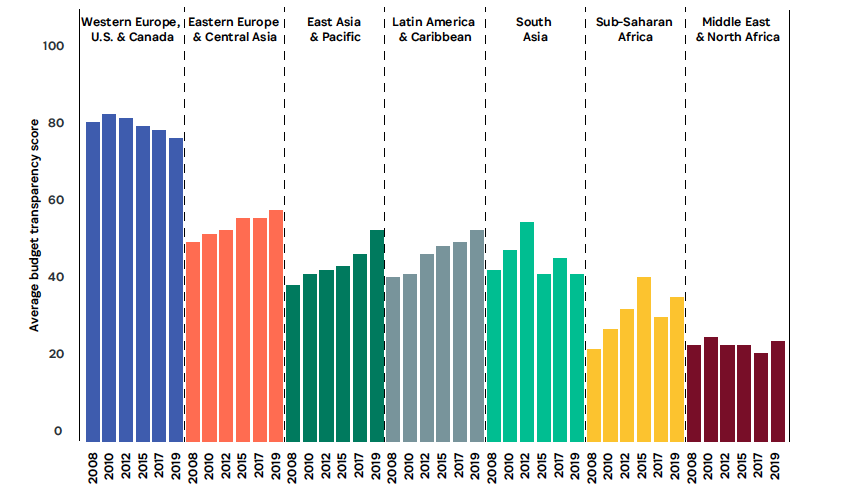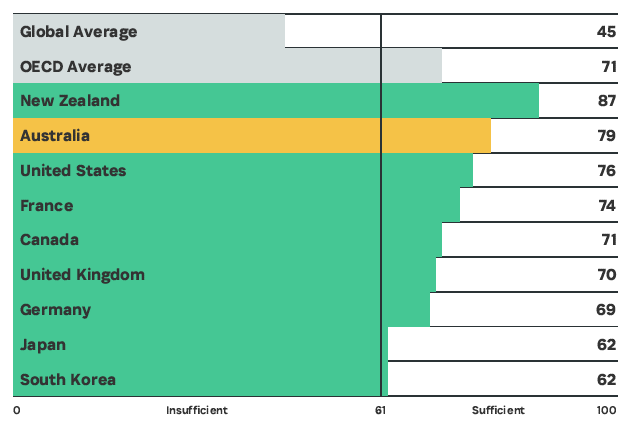At a time when the world is hit by the COVID-19 pandemic and governments rush to launch unprecedented fiscal measures to address the crisis and rescue the economy, the open budget agenda is more crucial than ever.
The release of the latest Open Budget Survey 2019 points to weak transparency and oversight of government spending around the world.
With the COVID-19 wreaking havoc, budget transparency may be low on the list of concerns for governments and the public. But the timely release of budget documents, explanation of the true state of government finances and support for public debate about budget priorities is of critical importance in times of emergency. As governments respond to urgent health and economic needs with more expenditure today, to be funded by taxes and debt in future budget cycles, open and credible budgeting is essential.
Yet, the Open Budget Survey finds that four out of five governments failed to reach the minimum threshold for adequate budget transparency and oversight. Even fewer countries provide opportunities for public participation in the budget. This is essential so that the public can hold their governments accountable for the COVID-19 response, now and later when the pandemic ends.
There is good news in improvements in transparency for Australia and for our region of East Asia and the Pacific, which has shown a strong and consistent trend up in average budget transparency scores since 2008 (see Figure 1).
Figure 1: Regional trends in budget transparency
Source: Figure 3.2, OBS 2019 Report, p. 40, https://www.internationalbudget.org/sites/default/files/2020-04/2019_Report_EN.pdf
Australia has good transparency and budget oversight
The Open Budget Survey finds Australia has good transparency and ranks near the top in budget transparency, with a score of 79 out of 100 and is eighth out of 117 countries (covering more than 90 per cent of the global population). This is an improvement from Australia’s ranking of 12 in the 2017 survey.
Australia publishes seven out of eight key documents on a timely and regular basis, including the Executive budget, enacted budget, citizen’s budget documents, in-year reports, the Mid Year Economic and Fiscal Outlook (MYEFO), a year-end report and audit report. Most of our budget documents are comprehensive and accessible.
The result is produced by an independent 2019 Survey report, which we prepared for Australia, the second time Australia has participated in the Survey – which started in 2006. Like civil society and academic groups in 117 countries around the world, we prepared a detailed online Questionnaire, substantiated with documentary evidence. Our report was reviewed by an anonymous independent reviewer and a government reviewer.
Comparatively, Australia leads most OECD peers, including the United States, France, Canada and the United Kingdom in the budget survey (see Figure 2). However, we still trail behind New Zealand, which has topped the Open Budget Survey for four consecutive rounds. Sweden, Norway, Mexico, Georgia, South Africa and Brazil are ahead of on publication of key budget documents.
Figure 2: Transparency in Australia compared to other countries
Source: https://www.internationalbudget.org/open-budget-survey/country-results/2019/australia
Participation and response to audit oversight can be improved
Australia’s budget oversight institutions are generally strong and vibrant. Australia scores well on budget oversight, especially in independent review by the Australian National Audit Office.
However, the government does less well on responding to audit reports. In the recent ‘sports rorts’ scandal, which is under review in a Senate Committee, the ANAO reported that a large proportion of sports grants were made to applicants that did not meet the independent ranking and criteria established by Sport Australia, before the last election. The ANAO strongly criticised the grant process. It has been suggested this indicates a need for an Independent Commission Against Corruption at the federal level. The OBS recommends new rules that require the government to respond explicitly to the audit findings including making reforms where these are called for by the auditor.
Balancing the needs for emergency decision making, participation and accountability can be tricky but it is important. It is commendable that the Australian Government has been largely transparent on the fiscal costs of its emergency response packages and has allowed amendments to its measures in response to public feedback (for example, extending the Coronavirus Supplements to a wider group).
As the focus now shifts to longer term economic support and recovery in the October 2020-21 budget (postponed from May), and future budgets it remains to be seen to what extent the Government will engage the public. The Economic Statement promised for June could perform the role of a published pre-Budget statement, as the budget has been postponed to October instead of May. There is an opportunity to inform and engage the public as well as the Parliament in decisions on the pathway to economic and social recovery.
Poor transparency leads to risks for COVID-19 recovery around the globe
The Open Budget Survey 2019 released today was completed before the COVID-19 pandemic (in Australia, we assessed the budget process of 2017-18 and 2018-19).
Despite significant improvements achieved in many countries since the first Survey in 2006 – and a dramatic expansion in the number of countries covered in the Survey – only 31 out of 117 surveyed countries have adequate levels of budget transparency and only 30 have adequate budget oversight. The picture is even more dismal on public engagement, with only 14 deemed to have adequate formal opportunities for the public to participate.
Many of the lowest performers in the Survey are oil-producing countries, low-income countries and authoritarian countries. Yet even among the OECD, which is generally wealthier and more developed, there remain countries including Spain, Hungary and Chile where budget transparency is inadequate.
These governments have not established the basic institutional infrastructure to facilitate an informed public debate on budgets and to hold governments accountable on their budget decisions. This is likely to be made worse by the COVID-19 pandemic as to facilitate quick decisions, some leaders may be tempted to bypass usual budget rules, and see public consultation as a luxury.
This is why the Tax and Transfer Policy Institute (TTPI) has signed on to a global call with more than 100 partners in the Open Budget Survey project for governments to accelerate progress on the open budget agenda. Fast improvements can be made in budget transparency and accountability, and this is needed more than ever in times of crisis.
This piece is co-published with Policy Forum, Crawford School and the Asia and the Pacific Policy Society’s platform for policy analysis, debate and discussion.








Recent Comments